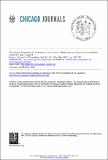The liberal treatment of difference : an untimely meditation on culture and civilization
Abstract
John Stuart Mill’s liberal vision included a notion of “civil advancement” whereby the free expression of a diversity of opinion would result not only in an initial collision of difference but also in an eventual consolidation as truth. The work of this article is to explore the ways and extents in which such liberalism can translate into a cosmopolitan anthropology. Is toleration of difference the appropriate anthropological ethic, or can one hypothesize a liberal “magnanimous” overcoming of difference? In a wide-ranging discussion, the voice of Mill is juxtaposed against those of C. P. Snow, Ernest Gellner, Stevie Smith, and Karl Popper. Much commentary would suggest that liberalism is passé. A political context dominated by renascent particularisms, militant religions, and resurgent ethnicities spells the collapse, it is told, of any Enlightenment project of liberal-humanist universalism. “Cultures are not options.” Notwithstanding, the argument is made here that as “opinion” grades into “knowledge,” so “culture” grades into “civilization” and local community (polis) into global society (cosmos). Difference may become a step along the way to a recognition of universal human truth.
Citation
Rapport , N J 2011 , ' The liberal treatment of difference : an untimely meditation on culture and civilization ' , Current Anthropology , vol. 52 , no. 5 , pp. 687-710 . https://doi.org/10.1086/661927
Publication
Current Anthropology
Status
Peer reviewed
ISSN
0011-3204Type
Journal article
Rights
© 2011 by The Wenner-Gren Foundation for Anthropological Research. All rights reserved.
Items in the St Andrews Research Repository are protected by copyright, with all rights reserved, unless otherwise indicated.

